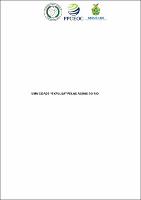| ???jsp.display-item.social.title??? |


|
Please use this identifier to cite or link to this item:
https://tede.ufam.edu.br/handle/tede/9063| ???metadata.dc.type???: | Dissertação |
| Title: | Urucurituba Velho uma cidade “expulsa” pelas águas do Rio Amazonas |
| ???metadata.dc.creator???: | Oliveira, Karla Karoline Sousa de  |
| ???metadata.dc.contributor.advisor1???: | Carvalho, José Alberto Lima de |
| ???metadata.dc.contributor.referee1???: | Jardim, Cinthya Martins |
| ???metadata.dc.contributor.referee2???: | Lima, Marcos Castro de |
| ???metadata.dc.description.resumo???: | No processo histórico de colonização da Amazônia os rios tiveram um papel determinante na organização do espaço, pois, por muito tempo, foram as únicas vias de comunicação nessa vasta região, de tal forma que todos os povoados e que posteriormente evoluíram para a condição de cidades, surgiram em margens de rios e lagos, fato ainda muito presente na realidade da Amazônia brasileira. A partir de 1970, além das alterações na conjuntura política, a dinâmica do comportamento do regime hidrológico do rio Amazonas também contribuiu para a mudança de cidades amazônicas. Esta pesquisa foi realizada no Distrito de Augusto Montenegro, localizado no Município de Urucurituba, Amazonas, Brasil, sendo a primeira sede municipal conhecida popularmente como Urucurituba Velho. É nesse contexto de interação entre o rio e o Distrito de Augusto Montenegro que as alterações na dinâmica e estrutura do espaço foram ocasionadas, chegando a acarretar a transferência da sede do município. Por esta razão, este trabalho tem como objetivo analisar os fatores utilizados para justificar a mudança da sede urbana de Urucurituba da planície de inundação para a terra firme. Os procedimentos adotados para o desenvolvimento desta pesquisa, consistem no levantamento bibliográfico para a compreensão da dinâmica do regime hidrológico do rio Amazonas e sua dinâmica fluvial, pesquisa de campo, pesquisa documental e análise de dados e informações obtidos durante a pesquisa. Assim, compreender e explicar as causas da mudança de sede do município de Urucurituba e fazer um acompanhamento sistemático da dinâmica do rio Amazonas, compreendendo a ocorrência dos impactos sociais, econômicos e ambientais do lugar, levando em consideração a análise de um conjunto de fatores que se apresentam na dinâmica da enchente e vazante na área de estudo. Nessa perspectiva, se faz necessário trabalhar a Geografia a partir de um olhar sistêmico, realizando um estudo do fenômeno natural das cheias e terras caídas, relacionando-os a uma discussão que abranja uma dimensão social. |
| Abstract: | In the historical process of colonization of the Amazon, the rivers played a decisive role in the organization of space, because for a long time they were the only means of communication in this vast region, in such a way that all settlements, which later evolved to the condition of cities, arose on the banks of rivers and lakes, a fact still very present in the reality of the Brazilian Amazon. From 1970 onwards, in addition to changes in the political conjuncture, the dynamic behavior of the hydrological regime of the Amazon River also contributed to the change of Amazonian cities. The research was carried out in the District of Augusto Montenegro, located in the Municipality of Urucurituba, Amazonas, Brazil, being the first municipal seat popularly known as Urucurituba old. It is in this context of interaction between the river and the District of Augusto Montenegro that changes in the dynamics and structure of space were occasioned, even leading to the transfer of the municipal seat. For this reason, this work aims to analyze the factors used to justify the change of the Urucurituba urban seat from floodplain to solid ground. The procedures adopted for the development of this research consist of a bibliographic survey for the understanding of the dynamics of the hydrological regime of the Amazon River and its river dynamics, field research, documentary research, and analysis of data and information obtained during the research. Thus, to understand and explain the factors that caused the change of the headquarters of the municipality of Urucurituba is to make a systematic follow-up of the dynamics of the Amazon River, understanding the occurrence of the social, economic and environmental impacts of the place, taking into consideration the analysis of a set of factors that present themselves in the dynamics of the flood and ebb in the study area. In this perspective, it is necessary to work Geography from a systemic point of view, carrying out a study of the natural phenomenon of floods and falling lands, related to a discussion of the social dimension of these factors. |
| Keywords: | Ciclo hidrológico Balanço hidrológico |
| ???metadata.dc.subject.cnpq???: | CNPQ::CIENCIAS HUMANAS::GEOGRAFIA::GEOGRAFIA HUMANA |
| ???metadata.dc.subject.user???: | Terras caídas Regime hidrológico Cheias Urucurituba Amazonas |
| Language: | por |
| ???metadata.dc.publisher.country???: | Brasil |
| Publisher: | Universidade Federal do Amazonas |
| ???metadata.dc.publisher.initials???: | UFAM |
| ???metadata.dc.publisher.department???: | Instituto de Filosofia, Ciências Humanas e Sociais |
| ???metadata.dc.publisher.program???: | Programa de Pós-graduação em Geografia |
| Citation: | OLIVEIRA, Karla Karoline Sousa de. Urucurituba (AM) uma cidade “expulsa” pelas águas do Rio Amazonas. 2022. 109 f. Dissertação (Mestrado em Geografia) - Universidade Federal do Amazonas, Manaus, 2022. |
| ???metadata.dc.rights???: | Acesso Aberto |
| URI: | https://tede.ufam.edu.br/handle/tede/9063 |
| Issue Date: | 6-Jul-2022 |
| Appears in Collections: | Mestrado em Geografia |
Files in This Item:
| File | Description | Size | Format | |
|---|---|---|---|---|
| Dissertação_Karla Oliveira_PPGEOG.pdf | 5.34 MB | Adobe PDF |  Download/Open Preview |
Items in DSpace are protected by copyright, with all rights reserved, unless otherwise indicated.




